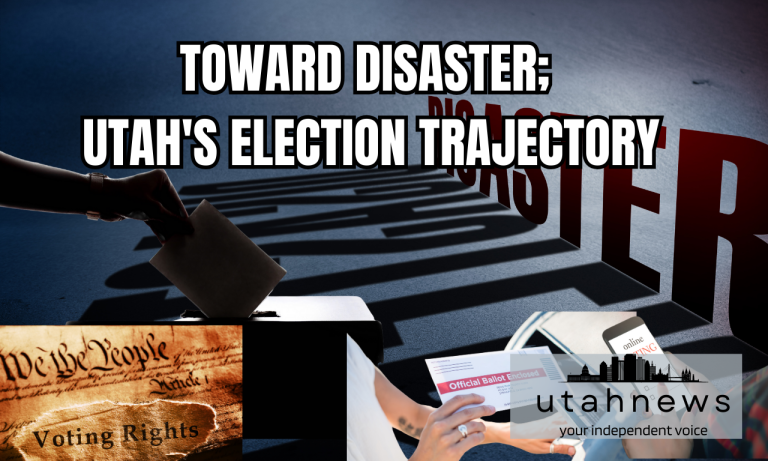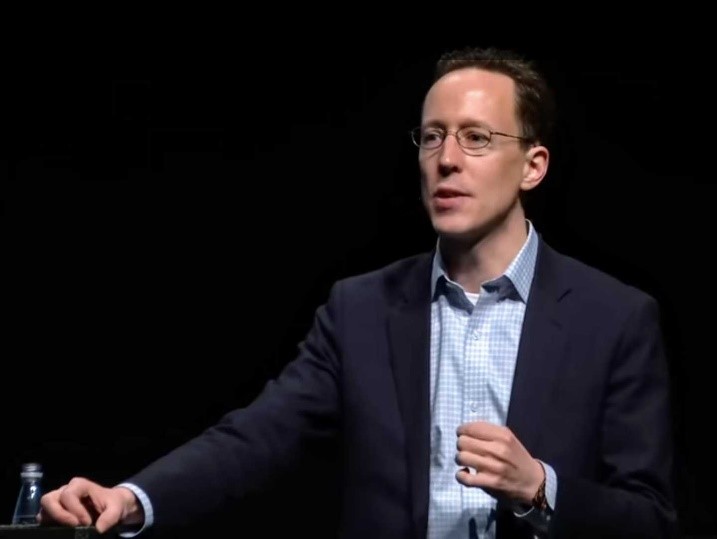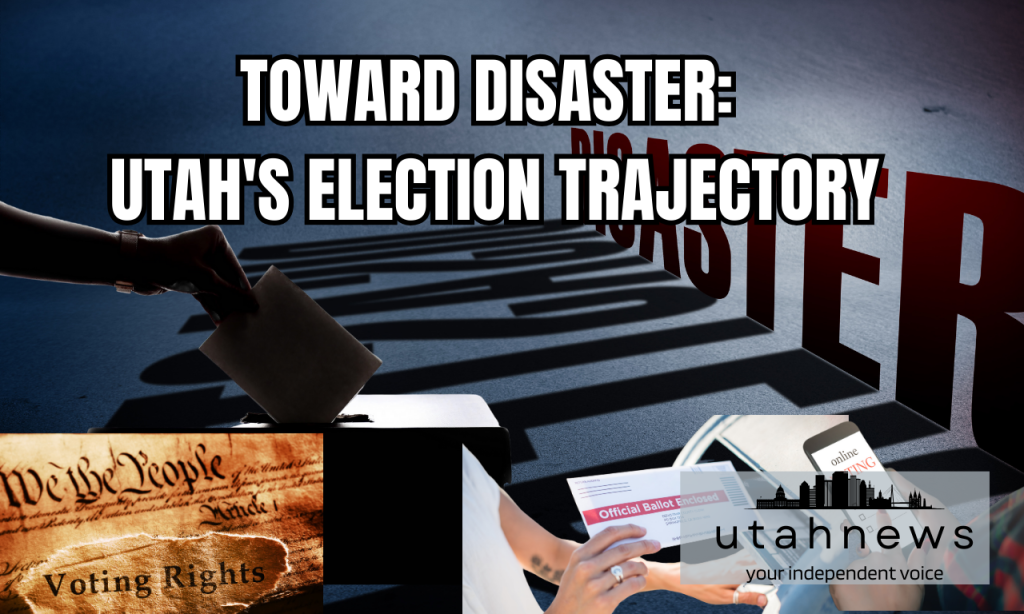
Toward Disaster; Utah's Election Trajectory
A UtahNews Special Report
Utah’s Elections
THE PAST: In person voting in neighborhood precincts with hand count; moved to option “may” vote by mail with machine count;
THE PRESENT: “Shall” vote by mail with machine count; Experiment with internet voting on cell phones and ranked choice voting
THE FUTURE?:Universal internet voting on cell phones, no more precincts, ranked choice voting, integration with digital ID and currency, handled nationally with national referendums, no electoral college
At the beginning of 2022, erstwhile volunteers for the SecureVoteUtah ballot initiative who were gathering signatures near the “Silicon Slopes” reported that “techies” they encountered were often the most eager to sign of any of our fellow citizens. They knew very well assurances that electronic tabulators used in Utah’s mail-in voting system were not connected to the internet were dubious at best, and that any computer-based system of voting or vote counting is going to be hackable.
We are reminded of that story in reviewing files in a GRAMA request that lays out the sordid effort by some Utah politicians to foist internet voting via cell phone on an unsuspecting and inordinately trusting Utah public. We are going to discuss the underbelly of some of that effort, including the role of Utah County Commissioner Amelia Powers Gardner, a national advocate for cell phone voting.
But let’s return for a moment to the subject of universal mail-in ballots and their tabulation by computers sometime after the election is over—sometimes many, many days after the election is over.
Voting Machines and Tabulators are Vulnerable to Fraud: the Halderman Report
Some of you are already thinking: what can go wrong? This is Utah. Which brings us to a detailed report by one of the top experts on voting machines and tabulators in America. It was submitted to a judge in Georgia as part of a lawsuit against the state for their use of Dominion voting machines. This report has had the unique distinction of being put under seal. That means it was, until recently, withheld from the public. Why?
It was authored by Professor J. Alex Halderman of the University of Michigan, a known “progressive” Democrat, not a passenger on the Trump Train. He assembled the report for a lawsuit filed by supporters of Democrat Stacey Abrams before the election and anticipating voter fraud, who felt she was cheated out of the Georgia governorship by Brian Kemp, the man who was in charge of Georgia elections when she ran against him in 2018. Obama-appointed Judge Amy Totenberg, sister of NPR commentator Nina Totenberg, is the judge on the case which continues. She complied with a request to keep the report secret that came from the Cybersecurity and Infrastructure Security Agency (CISA). The federal cyber watchdog cited, you guessed it, “national security concerns.” (CISA is the same agency whose top official told the world that the 2020 election was the most secure ever.) The judge agreed that the depiction of the flaws in the Dominion Image Cast X voting system was a national security threat if disseminated in graphic detail to the public. As pressure built for a release of Halderman’s findings, CISA sent an advisory to election officials about potential vulnerabilities while the judge continued to keep the full report under seal.
With the report’s recent release Dominion attempted a rebuttal. But NBC news tells us that Halderman’s findings, finally unsealed and available for public examination, were validated by 20 fellow cybersecurity experts as well as by the CISA advisory. You can see a summary of the numerous problems Halderman discovered on pgs. 4-7 of the document. They included vulnerability to the insertion of malware, false user credentials, manipulation of QR codes, and means to thwart vote audits. He points out malware can be inserted into one machine and infect an entire county system, including vote tabulators.
Georgia’s peach of a Secretary of State, Brad Raffensberger, also attempted a rebuttal, stating that Halderman was given insider information that members of the public don’t have to find these vulnerabilities, so there’s really nothing to worry about. He is planning to replace the machines in question but not till after the 2024 elections. We’ll assume the very best, that no skilled hacker in the general public can get ahold of the type of information that Halderman used to evaluate Georgia’s voting machines. There is however, the most skilled and organized hacker threat in the world, coming from the governments of Russia and China. Should we worry? Well, hmmm, we are actually, if not technically at war with Russia, and just sent cluster bombs to kill their soldiers. And China is preparing for war with us, if you believe the boss over there, or some of his top military strategists. Meanwhile, it appears China has planted malware that could disrupt USA military operations. I’ll let the reader be the judge if there might be a foreign threat looming to our cyber-based elections.
Dr. Halderman’s conclusions about Georgia’s Dominion voting machines generally aren’t new, or confined to one product, or one company. Halderman and many of his colleagues have sounded the alarm for years about electronic voting machines and tabulators, like the ones Utah is now totally dependent upon to administer elections here. What about other Dominion products and those from the other large election vendors ES&S (used throughout Utah) and Hart? Halderman commented on his now-released report.
There are systemic problems with the way election equipment is developed, tested and certified, and I think it’s more likely than not that serious problems would be found in equipment from other vendors if they were subjected to the same kind of testing.
The three dominant voting machine companies have been described as selling equipment that all have similar “DNA.” In other words, certain aspects of the technology has common origins and performs similarly across the companies. And that’s not good if you believe Dr. Halderman. And did I mention the HBO documentary that touted his views on voting machines, Killchain, showed hackers getting into every electronic election machine they had in front of them at a convention in Las Vegas in 2018? Dr. Halderman states:
Security researchers studied numerous U.S. voting machines 10-20 years ago, and their findings clearly established that voting equipment tends to suffer from security flaws. Yet one might wonder whether election equipment sold today is more secure than equipment produced in decades past. Our findings suggest the answer is no.

Professor J. Alex Halderman is the director of the University of Michigan’s Center for Computer Security and Society. He is a nationally renowned expert on electronic voting machines. In 2015 he was named one of the “Brilliant 10” by Popular Science. His report on Dominion voting machines in Georgia was kept from the public for “national security” reasons. His analysis of the dangers of machine voting and tabulation was featured in the HBO documentary Killchain, which was nominated for an Emmy in 2021.
(photo: media.ccc.de, CC BY 3.0 <https://creativecommons.org/licenses/by/3.0>, via Wikimedia Commons)
The Trajectory of Utah Voting: the IVote Report
Thanks primarily to universal vote-by-mail these “voting machines” are part of the wonderful Utah election system, which as you remember, is also described by official Utah leadership as “the gold standard” for elections. So when some of our leaders tell us the voting system is going to get even better than this, why wouldn’t we believe them? You see, Utah leadership is plugged in. They’re on top of all the latest trends. That’s why Gov. Spencer Cox, even though he has had some memory problems about this, is an enthusiastic cheer leader for “smart cities.” One wonders how he feels about some of that other great “smart” stuff, like letting your appliances spy on you “to help you shop.” We have a pretty good idea about his feelings toward digital ID. Then there’s digital currency that you won’t lose and wow, you don’t have to balance your check book, and that camera thing, you know, where they are literally everywhere. When Cox was Lt. Governor the state signed a pathbreaking agreement to integrate “thousands” of government cameras in Utah with AI. This is just like they do it in the home of the social credit score, communist China, which is a very “attractive model,” according to other smart people, like Klaus Schwab of the World Economic Forum, for example.
(You are hopefully aware that modern China is a 1984-style dictatorship with spies all over America who steal our technology to supply a menacing military. We were recently told they also have secret police stations in American cities (including Salt Lake City) to keep Chinese people in our country “in line.” Oh, and these same Chinese communists have a cozy relationship with Utah leaders. This last point is not according to some rightwing kook who reads the Constitution all day, but to that extremist news agency, Associated Press (AP).)
And that’s why Utah was not asleep at the switch when the talk about voting on the internet began. That’s why in 2015, then Lt. Gov. Cox convened a group of august citizens to discuss and help us all get ready for the inevitable wonderfulness of voting on the internet. Yes, we are referring to the committee who produced their very well thought out conclusions and attempts at political cover only found in the memory-holed IVote report.
Let’s look at this document. Wow, it’s signed by some very influential people. Not only Spencer Cox, then the Lt. Governor, but also state Senator Curt Bramble, a promoter of internet voting who, by the way, has a number of private clients who seek a close relationship with communist China (see AP report above). There’s also Ricky Hatch, a plugged-in guy in his own right, who networks with county clerks across America, and served on Mark Zuckerberg’s Center for Technology and Civic Life (CTLC) national advisory board (the “Zuckerbucks” people). Sherri Swenson, that venerable matriarch of Salt Lake County voting who presided over the adoption of Dominion voting equipment in that jurisdiction, was also included. Ryan Cowley, a serious election administrator who worked for Weber County in 2015 was a part of the group. Today he is Utah’s state election director under Lt. Governor Ms. Deidre Henderson. (Here’s a video to give you an idea about how she rolls.) These notables joined some others to produce the IVote report.
The report begins by pointing out in 2015 that Utah already had the authority to allow sending ballots over the internet to the military and “overseas citizens,” a practice that Utah was severely criticized for in 2018 by the left-leaning Center for American Progress. Within a few paragraphs the group tentatively offers that “making voting more convenient may increase the number of voters participating in elections.” The emphasis should be put on “may,” because this notion, outside of some low turnout off year elections like for school board, has little factual basis (See also the SecureMyVote petition documentation at SecureVote.News). Election Director Ryan Cowley in 2022 weakly responded at a hearing where the question was asked about increased turn out that there “is a little bit of a bump from mail-in voting.”
The report also touts another “may.” Internet voting “may also improve turnout among younger voters because they may be more likely to respond to internet voting favorably.” Aside from the implication that the youth vote won’t increase until voting is made more like a video game than a boring exercise in choosing our leaders, there is another problem. 100% internet voting on smartphones will surely decrease the number of seniors who vote, as they get tangled up in “downloading the app” and following a rather long list of instructions. Here, for example, are directions for using the Voatz app, originally produced for that shining democracy, Venezuela. We’ll get more into Voatz in a moment. So it appears we would, at best, be exchanging some of our most knowledgeable and interested voters for some of the least knowledgeable, or at minimum, the much less motivated.
The IVote report points out several internet voting vulnerabilities that any expert would have shared with them in 2015 (this is the political cover part). But the committee was quick to provide suggestions to aid the transition to cyber-based elections. One of them is on the fast track as we speak: enacting digital ID for Utahns (see link above). This move would not only satisfy some cybersecurity types, but it also would provide happiness to the corporate denizens of the World Economic Forum and other lovers of communist China’s social credit score system. (Civil liberty advocates, not so much). Another suggestion was to focus the internet voting effort on cell phones, which the report tells us are safer than virus-laced desktops and laptops.
In fact, the real tell here is what happened after the IVote report was issued. Frequently government commissions and advisory committees are performative and their reports go straight to oblivion. This appears to be the case with the IVote report text, but not with certain content within the report. First, its tone unescapably exudes the idea that we are talking about “when,” not “if” internet voting is going replace the current system. The Ivote document calls for policy
That encourages a broader use of vote centers and voting by mail may ease the transition to internet voting. Transitioning voters to a mail ballot will help shift the idea that voting must take place at an external location and move the voting experience into a voter’s personal space at a date and time of their choosing. Voting by-mail would ease the cultural shift to internet voting.
After the report was issued Utah’s legislature required local officials to comply with universal vote-by-mail by changing one word, “may” to “shall,” regarding local voting requirements. This appears to have been sprung on the public to minimize debate (and opposition) to Utah becoming the first GOP state with compulsory vote-by-mail. You can bet the state House and Senate leadership were not selling universal mail voting by telling the public the change was “to help voters and election officials prepare for internet voting in the future” as contemplated in the IVote report. The report also advises that “internet voting should be implemented as pilot projects that are slowly expanded.” Sure enough, a pilot project bill sponsored by Sen. Bramble was initiated post-report for cities and counties encouraging experimentation with internet voting and its first cousin, ranked choice voting.

Utah Gov. Spencer Cox gets some laughs at the White House, including from its chief occupant. While Cox ran Utah’s election system as Lt. Governor the state became a founding member of the Soros-backed ERIC (Electronic Registration Information Center). Cox presided over the committee that produced the IVote report. He has cheerleaded Utah’s adoption of universal mail-in ballots, and experimentation with blockchain-based internet voting, which he called “secure,” in defiance of the scientific consensus which exists to this day.
(White House photo)
Blockchain and Voatz
But there was still the question of the major league concerns about the safety of internet voting, as the IVote report acknowledged. A single word has been used in an attempt to put a blanket over security problems related to data transferred over the internet. That word is “blockchain.” We will only say Gov. Cox has started yet another one of those advisory committees, this one to make recommendations about that “promising new technology,” blockchain. And Voatz, a controversial cell phone voting system, has shown up in Utah promoting their use of blockchain as the means to ensure election security.
For-profit Voatz is backed by the nonprofit Tusk/Montgomery Philanthropies. Its founder is Bradley Tusk, a former Lehman Brothers partner and a high level Democratic party operative who has worked for Sen. Chuck Schumer (Communications Director), Illinois Gov. Rod Blagojevich (Dep. Governor), and New York City Mayor Michael Bloomberg (Campaign Mgr.). He has been called “Silicon Valley’s favorite political fixer.” Tusk has done projects with the globalist Rockefeller Foundation, Stanford University, Comcast, Google, and Walmart. Tusk/Montgomery Philanthropies’ former president, Sheila Nix, was an assistant to President Barack Obama and later chief of staff to 1st Lady Jill Biden. The current president is Bob Greenlaw, who like Tusk and Nix, is a prominent Democrat who also served as a Deputy Governor of Illinois (cabinet level appointment).
Voatz’s Bradley Tusk makes the ridiculous, but calculating claim that politicians won’t listen to us until mobile internet voting raises the turnout. While he is working the internet voting talking points all around America, there is one he doesn’t highlight in Utah. He promises one that one great outcome from internet voting will be gun control.
Voatz promotes and defends its product in a sharp-elbowed manner similar to Dominion. They have made a number of enemies among the top echelon of cybersecurity experts, who believe Voatz security claims are wrong and unprovable, while their responses to critics have been dishonest. This didn’t prevent Lt. Governor Spencer Cox from providing Tusk’s PR department with a glowing quote:
I am thrilled that Utah County is partnering with Tusk Philanthropies, Voatz, and the National Cyber Security Center to bring these secure, blockchain-based voting options to Utahns overseas for the upcoming municipal election.
The National Cyber Security Center sounds like some official body that knows what it’s doing but is actually just another leftish “public-private partnership” NGO, this one spreading from the confines of progressive Colorado thru former governor John Hickenlooper. The question is, in 2019 how did Cox know those “blockchain-based voting options” were so “secure?” He seemed to know more than a raft of cybersecurity experts about the safety of blockchain and voting. Take the conclusion of MIT researchers:
Their security analysis of the application, called Voatz, pinpoints a number of weaknesses, including the opportunity for hackers to alter, stop, or expose how an individual user has voted. Additionally, the researchers found that Voatz’s use of a third-party vendor for voter identification and verification poses potential privacy issues for users.
The researchers, mortified that the Voatz app was being enthusiastically tried in places like Utah, plead for transparency and Voatz’ cooperation in evaluating this closed-sourced system. Another team of top researchers, led by David Jefferson of the Lawrence Livermore Laboratory, after getting what they felt was the runaround by Voatz, demanded answers to a battery of questions they had about the security of the internet/blockchain voting system. They stated “the company has not disclosed its source code nor allowed its system to be examined openly by third party experts.” The left-of-center Free Speech for People, an election watchdog group also backed by noted experts, finally reached out to Utah A.G. Sean Reyes after getting the stonewall from Voatz.
We write to urge you to initiate an investigation into the voting system vender Voatz for advancing potential false claims and deceptive marketing practices…. Though many computer security experts vociferously expressed skepticism or distrust at Voatz’s claims as unsupported, spurious, or misleading, Utah County elected to engage Voatz and implement its mobile voting system.
The letter continued, pointing out Voatz refused to share their research with a concerned U.S. Senator, Ron Wyden, and that Voatz attacked the MIT results despite validation from the Dept. of Homeland Security.
Even though the DHS had validated the MIT’s findings, Voatz,’s strenuous denials and attacks on the MIT report were successful in convincing some of its customers that Voatz’s security claims were valid and that the MIT findings were false. Utah County Clerk Amelia Powers Gardner repeated the same spurious (and subsequently disproven) explanations.
(Note the strong words about the Utah County Clerk at that time. See more below.) Finally, in a bid to restore at least a modicum of credibility, Voatz hired independent cybersecurity firm Trail of Bits to investigate. As reported by the state government policy site Statescoop, the results weren’t pretty. Trail of Bits found
16 “severe” technical vulnerabilities. These include sensitive user data being exposed to the company’s developers and improper use of cryptographic algorithms, a blow to a company that has staked its reputation on its use of blockchain technology. The audit confirmed the findings revealed last month by researchers at the Massachusetts Institute of Technology who found, among other flaws, that Voatz’s use of third-party vendor to authenticate the identity of its users could compromise the anonymity of ballots the app collects.
Concern about developments of this kind were spreading across the scientific community. In April, 2020 the respected scientific society the American Association for the Advancement of Science (AAAS) sent a letter to U.S. Governors, signed by dozens of scientists and policy experts. This is a long quote but you need to read it.
Internet voting, which includes email, fax, and web-based voting as well as voting via mobile apps such as Voatz, remains fundamentally insecure. Scientists and security experts express concern regarding a number of potential vulnerabilities facing any internet voting platform, including malware and denial of service attacks; voter authentication; ballot protection and anonymization; and how disputed ballots are handled. Importantly, there is no way to conduct a valid audit of the results due to the lack of a meaningful voter-verified paper record. If a blockchain architecture is used, serious questions arise regarding what content is stored in it, how the blockchain is decrypted for public access, and how votes are ultimately transferred to some type of durable paper record. No scientific or technical evidence suggests that any internet voting system could or does address these concerns.
The letter continued about blockchain.
Blockchain-based voting systems introduce additional security vulnerabilities and do not address the fundamental security concerns scientists, election security experts, and government officials have expressed since the advent of internet voting.
I guess this is why you can find peer-reviewed academic papers with titles like this one that appeared in the Journal of Cybersecurity 7:1 in 2021 “Going from bad to worse: from Internet voting to blockchain voting.” But why did Spencer Cox, celebrated continually on national TV shows and the architect of our current “gold standard” election system, tell us that Voatz’s internet, blockchain-based system was “secure” in 2019? Maybe Cox and “national expert” Amelia Powers Gardner are more interested in selling you something than they are in making sure what they are selling is safe. Gardner was one of the first “experts” named by Cox to his new blockchain commission.
Blockchain is not just about administering elections on the internet. It’s becoming central to the entire digitized governance architecture envisioned by the World Economic Forum (WEF) types and others. We said earlier in this article that Utah’s IVote committee saw the opportunity for digital ID to make the argument that voting on the internet is actually safe. In 2023 your government ID, voting, credit, money, health records, and somebody’s idea of your good behavior are now being conceptualized as one digital record. Your privacy in this 1984-style circumstance is supposed to be insured by something called “decentralized blockchain.” But as this Harvard Business Review article impolitely points out, this will all be a matter of “enactment.” In other words, you will have to “trust the government” and other institutions. Have a problem with that? Well, there goes your social credit score.

Curt Bramble is an influential Utah State Senator, seen here speaking at a bill signing with Gov. Gary Herbert. He was a member of the IVote committee which advised transitioning from in-person voting to universal mail-in voting, before moving to an internet-based voting system. He authored the bill that authorized experimenting with ranked-choice and cell phone voting in local elections.
(Utah State Senate photo)
But back to our story. Journalists have noticed that certain government election officials have continued hell-bent on pursuing voting on the internet, despite the lack of transparency, despite all the expert warnings about it’s safety, despite false promises that more people will vote. In one national story on this bizarre phenomenon we find both Sen. Curt Bramble and Amelia Powers Gardner, now a Utah County commissioner. She told the publication Stateline, which follows state policy issues:
Utah County uses the Voatz app, which satisfies her security standards and, she said, gives voters an alternative to an “antiquated” system that disenfranchises millions of voters…. “We looked for a solution,” she said. “We have the ability to serve underserved populations.”
This is breathtaking. Ms. Gardner has ignored the security warnings of dozens of experts, in prioritizing the “disenfranchised,” and “underserved.” Does she mean those “millions” who are wholly incapable of putting a stamp on an envelope, much less appearing at their new “voting center” to vote? Or is she just transparently climbing the ladder of a system determined to make us vulnerable to sycophants masquerading as “experts,” pushing us into a digital tyranny on every front, including elections? A note: Utah County was only one of two Utah counties to take “Zuckerbucks” in the 2020 elections.
Well, I know Spencer Cox told us the original Voatz app was “secure,” but after suffering one damning review after another the Voatz godfather, Bradley Tusk, is now selling us a new and improved Voatz. Whether this version will end up to be blockchain or cloud base, it will be safe, he promises!
Was Utah’s Enactment of Universal Mail-In-Voting a Psyop?
Let’s review. A recent report, suppressed by a national security agency, supported by 20 cybersecurity experts, shows terrible vulnerabilities in a voting system produced by the same company who is an election contractor in this state. Our current system of mail-in voting with computer tabulation depends upon vendors like this one whose reliability has been called into question, big time. Experts agree that all electronic voting systems are hackable. Some of the best hackers in the world are found among our geopolitical enemies. The state of Utah appears to have followed a report commissioned in 2015 by the Lt. Governor’s office (Cox) which calls for the institution of mail-in voting (which brought 100% computer tabulation), to get Utahns away from the idea of voting in person in their neighborhoods. But mail-in voting was not the goal.
It seems like, at least to a suspicious type, that the whole mail-in voting thing was, dare we say it, a psyop, to smoothly transition the state from mail-in voting to the actual goal, voting on the internet. Voting on the internet is not safe but the tone of the IVote report and subsequent events give us reason to believe our leaders will try to foist it on us anyway, at some point. But not to worry, the implementation of digital ID and blockchain technology is supposed to make it safe. As the World Economic Forum and others tell us, blockchain will allow us to move forward with all aspects of the new digital society, including ID, voting, health records, credit, banking, etc. This is indeed a new era. Bloomberg tells us the surveillance state is already a reality, so what’s the big deal?
But back to Utah’s elections, where we end with two simple questions that folks tend to ask after they find out about the information we have just presented to you. Why are we “experimenting” at a juncture of history where the number of Americans losing confidence in our election system continues to rise? Why are we letting the Governor, Lt. Governor, and Utah’s legislative leadership move us along, from what was the safest, most efficient election system possible (in-person voting with photo ID, hand counts, results on election night) toward a nightmare of vulnerabilities that are self-evident in their potential for disaster?

